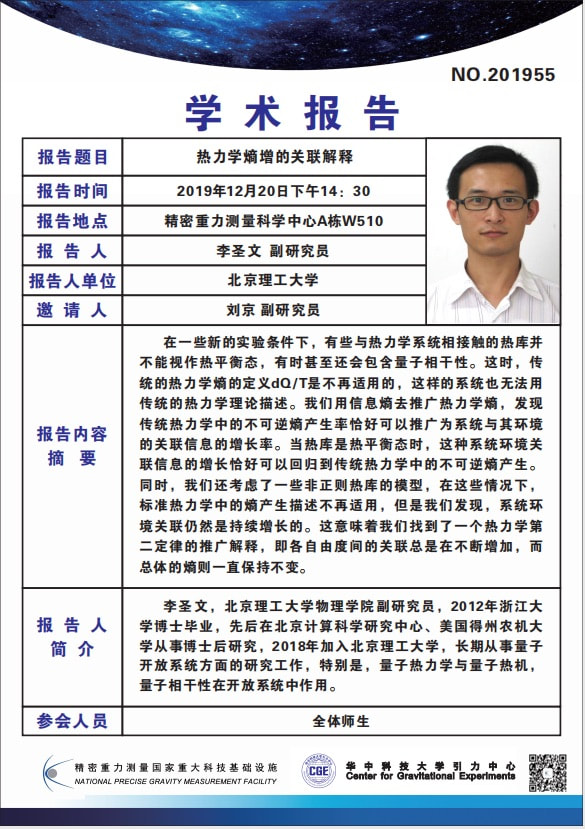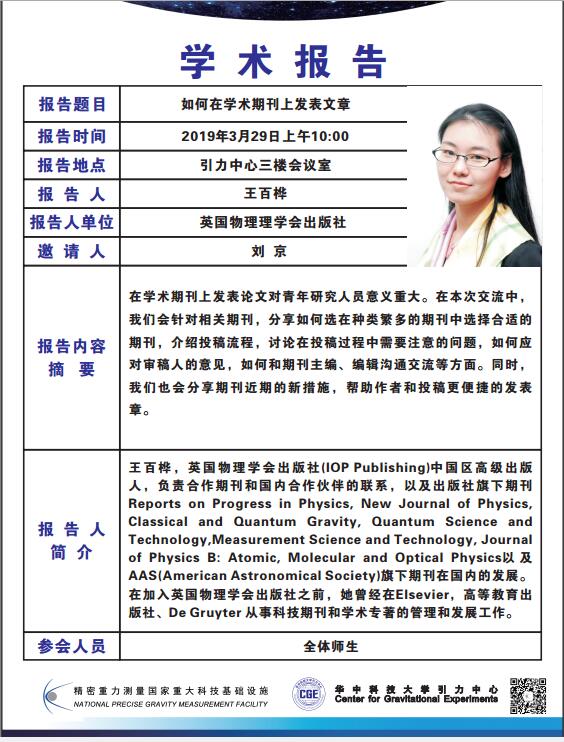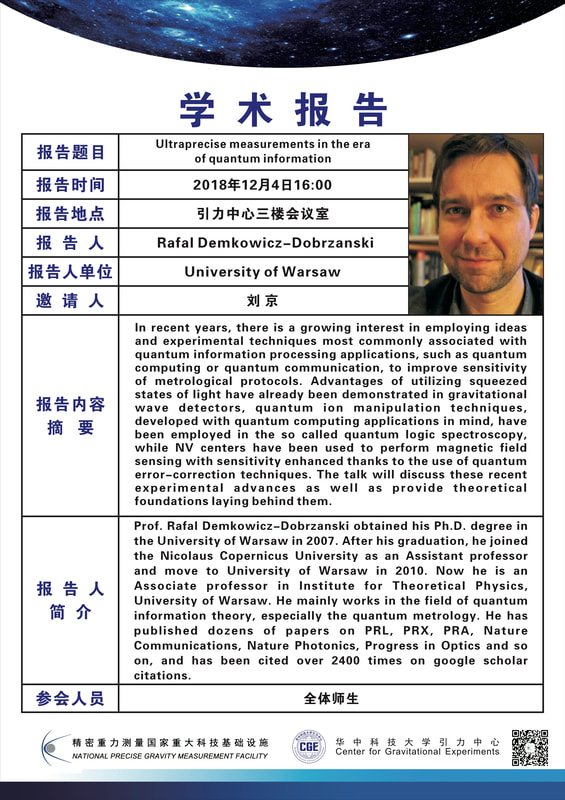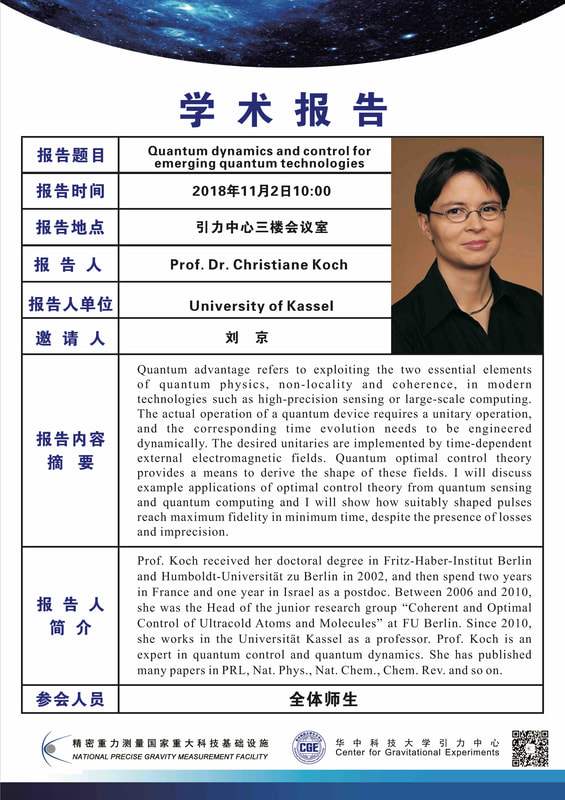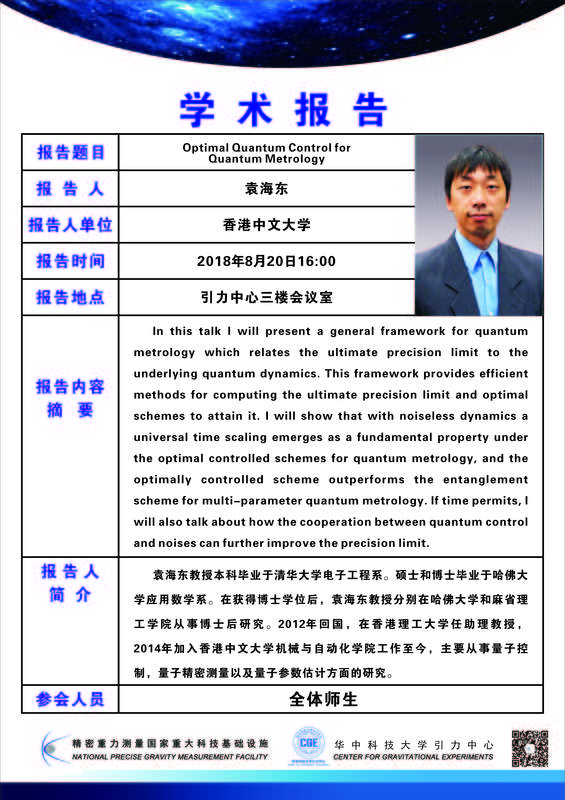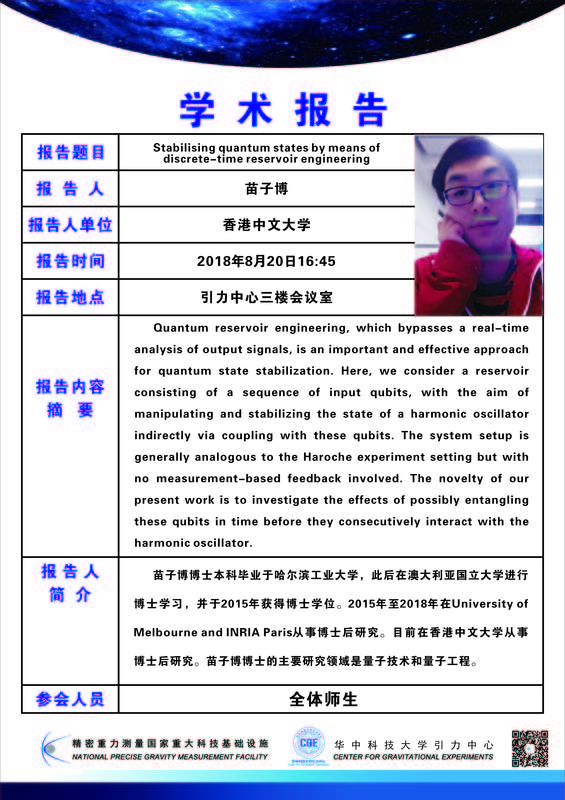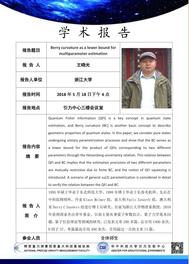|
热力学熵的关联解释
Date: December 20, 2019 Talker: Prof. Shengwen Li (李圣文), Beijing Institute of Technology Abstract: 在一些新的实验条件下,有些与热力学系统相接触的热库并不能视作热平衡态,有时甚至还会包含量子相干性。这时,传统的热力学熵的定义dQ/T是不再适用的,这样的系统也无法用传统的热力学理论描述。我们用信息熵去推广热力学熵,发现传统热力学中的不可逆熵产生率恰好可以推广为系统与其环境的关联信息的增长率。当热库是热平衡态时,这种系统环境关联信息的增长恰好可以回归到传统热力学中的不可逆熵产生。同时,我们还考虑了一些非正则热库的模型,在这些情况下,标准热力学中的熵产生描述不再适用,但是我们发现,系统环境关联仍然是持续增长的。这意味着我们找到了一个热力学第二 定律的推广解释,即各自由度间的关联总是在不断增加,而总体的熵则一直保持不变。 |
|
Ultraprecise measurements in the era of quantum information
Date: December 4, 2018 Talker: Prof. Rafal Demkowicz-Dobrzanski, University of Warsaw Abstract: In recent years, there is a growing interest in employing ideas andexperimental techniques most commonly associated with quantuminformation processing applications, such as quantum computing orquantum communication, to improve sensitivity of metrologicalprotocols. Advantages of utilizing squeezed states of light havealready been demonstrated in gravitational wave detectors, quantumion manipulation techniques, developed with quantum computingapplications in mind, have been employed in the so called quantumlogic spectroscopy, while NV centers have been used to performmagnetic field sensing with sensitivity enhanced thanks to the useof quantum error-correction techniques. The talk will discuss theserecent experimental advances as well as provide theoreticalfoundations laying behind them. |
|
Quantum dynamics and control for emerging quantum technologies
Date: November 2, 2018 Talker: Prof. Christiane Koch, University of Kassel Abstract: Quantum advantage refers to exploiting the two essential elements of quantum physics, non-locality and coherence, in modern technologies such as high-precision sensing or large-scale computing. The actual operation of a quantum device requires a unitary operation, and the corresponding time evolution needs to be engineered dynamically. The desired unitaries are implemented by time-dependent external electromagnetic fields. Quantum optimal control theory provides a means to derive the shape of these fields. I will discuss example applications of optimal control theory from quantum sensing and quantum computing and I will show how suitably shaped pulses reach maximum fidelity in minimum time, despite the presence of losses and imprecision. |
|
Optimal Quantum Control for Quantum Metrology
Date: August 20, 2018 Talker: Prof. Haidong Yuan (袁海东), The Chinese University of Hong Kong Abstract: In this talk I will present a general framework for quantum metrology which relates the ultimate precision limit to the underlying quantum dynamics. This framework provides efficient methods for computing the ultimate precision limit and optimal schemes to attain it. I will show that with noiseless dynamics a universal time scaling emerges as a fundamental property under the optimal controlled schemes for quantum metrology, and the optimally controlled scheme outperforms the entanglement scheme for multi-parameter quantum metrology. If time permits, I will also talk about how the cooperation between quantum control and noises can further improve the precision limit. |
|
Stabilising quantum states by means of discrete-time reservoir engineering
Date: August 20, 2018 Talker: Dr. Zibo Miao (苗子博), The Chinese University of Hong Kong Abstract: Quantum reservoir engineering, which bypasses a real-time analysis of output signals, is an important and effective approach for quantum state stabilization. Here, we consider a reservoir consisting of a sequence of input qubits, with the aim of manipulating and stabilizing the state of a harmonic oscillator indirectly via coupling with these qubits. The system setup is generally analogous to the Haroche experiment setting but with no measurement-based feedback involved. The novelty of our present work is to investigate the effects of possibly entangling these qubits in time before they consecutively interact with the harmonic oscillator. |
|
Berry curvature as a lower bound for multiparameter estimation
Date: May 18, 2018 Talker: Prof. Xiaoguang Wang (王晓光), Zhejiang University Abstract: Quantum Fisher information (QFI) is a key concept in quantum state estimation, and Berry curvature (BC) is another basic concept to describe geometric properties of quantum states. In this paper, we consider pure states undergoing unitary parametrization processes and show that the BC serves as a lower bound for the product of QFIs corresponding to two different parameters through the Heisenberg uncertainty relation. This relation between QFI and BC implies that the estimation precisions of two different parameters are mutually restrictive due to finite BC, and the notion of QFI squeezing is introduced. A scenario of general su(2) parametrization is considered in detail to verify the relation between the QFI and BC. |
